#Language translation tool for website
Explore tagged Tumblr posts
Text

(Source)
I really liked these unique scenes that were made for the Pikmin Garden website entry on caves. Technically, neither of these use unique assets, but it's kinda cute that they went through the trouble of making these scenes just for character building.
It almost gives me hope for DLC~
#pikmin#pikmin 4#olimar#louie#i say 'building' but the dialogue actually doesn't tell us anything we don't already know:#olimar thinks logically. louie thinks with his stomach#but these articles are still cute~ canonically they're all written by Chet#i get by from translating the text using the language tool add-on. it's kinda interesting reading how they reconcile all the continuities#as far as the website is concerned: all games are canon and nothing is officially retconned#it's up to you if you want to believe that though#my favorite article so far is about space suits#like... did you know that the 'collar' the president wears is actually a bib?#or that there's an actual reason you can instantly change your spacesuit color?
62 notes
·
View notes
Text
The Art of ChatGPT Profit: Monetization Techniques for Financial Growth
How to make money with ChatGPT? What is ChatGPT? OpenAI created ChatGPT, an advanced language model. It is intended to generate human-like text responses in response to given prompts. ChatGPT, which is powered by deep learning algorithms, can engage in natural and dynamic conversations, making it an ideal tool for a variety of applications. ChatGPT can be used for a variety of purposes,…

View On WordPress
#AI#chatbot platforms#ChatGPT#ChatGPT services#ChatGPT-powered products#consulting services#content creation#create a website#customer support tools#freelancer#Freelancing#language translation services#make money#make money with ChatGPT#marketing and selling#monetization#monetizing#monetizing AI#OpenAI#prompt engineering#prompts#Social media platforms#Virtual assistants
0 notes
Text

. Reverse:1999 Resource Guide
These are links to some of the archives, lorecrafters and guidemakers that I follow and regard highly for their expertise, dedication, and contributions to the community. Making this list is also for my convenience.
If you know other sources, please share them! I will edit the post and add them here. Maybe one day I will also contribute to transcripts on a separate blog. We don't have enough of such precious records for a heavily lore and story-based game! Feel free to share your lorecrafting website/blog/channel too!

Archives
Websites/Blogsites
Huiji (CN) - CN Fanwiki, written in CN, with consistent updates. Really goated. Gamekee (CN) - Another CN Fanwiki, also written in CN. Some pages may not be updated. Arcanist Sanctum (Global) - That's us! R1999 Logs (Global) - Has some main, event and anecdote story transcripts. Reverse: 1999 Wiki (Global) - EN Fanwiki. They may be behind on working through some profiles, records and transcripts. UTTU Merui (Global and CN) - The website is also WIP. But it is shaping to contain news (including EN translations for CN updates), character profiles, story transcripts, music list, timeline, and I believe recorded CGs too.
Repositories
Myssal's Assets Repository (CN) - In-game assets. It has everything. Myssal just that goated. reverse 1999 png (CN) - PNGs/cutouts telegram. Russian language but you can use character tags by clicking on pinned message. They accept requests, but you probably will have to ask them in Russian. Their cutouts can be accessed and downloaded by going through post comments. Posts with arrows. reverserenders (Global) - official art renders tumblr blog. They accept requests!
Documents
Abyss_Idiot's links (Global) - Transcripts, archives and general lore. Actually lots of records done by several Discord members. May not be updated. As of making this list, I haven't seen anything from 2.0 onwards.
Youtube
八咫烏_Merui (CN & Global) - Event and main story playthroughs without commentary Reverse: 1999 Timekeeper (Global) - They have everything recorded. And I mean everything. Reverse 1999 Archive (Global) - On hiatus (?), they pretty much covered event and main stories up to Notes on Shuori.

Lorecrafting & Story Analysis
Youtube
Apeironite - Pretty chill format. Interesting in-depth analyses. As of now, I don't know any other YT content creator who tackles on game lore as much as he has. FructoseTolerant - While there have yet many Reverse:1999 character analysis content in her channel, once she does post one, it's really good. I recommend watching and listening to her thoughts!

Guidemakers
Websites/Blogsites
Prydwen (CN & Global) - Tierlists, psychube recs and character guides Gnomon (Global) - I am in-love with this website tbh. Has all character information, including sprites! Effect descriptions, material sources and descriptions, resonance build (up to R15), psychube recs, team recs, and very easy to follow guide on how to play each character + rotations! Also has information on series of dusks artefacts and mechanics, reveries in the rain guides, and tips for mane's bulletin! GAAAAAHHH!
Documents
Discord Community Tierlist (CN) - Tierlists, calculators, builds. Likely where most of the global theorycrafting started. bluforest's Scuffed Page for Recommended Resonance Layouts (CN) - Also has resonance codes! Spiritzhl's Unit Build Guide (CN) - Psychubes, resonance, portrays, reveries and euphoria info, critter rehabilitation guide. Arcalive Reverse 1999 (outdated) - Written in KR. Resonance and psychube recommendations, calculators.
Youtube
Jakazin (CN & Global) - Comprehensive character guides Devibul (CN) - Puzzle guides, character showcases Destroth (Global) - Comprehensive character guides, showcases

Useful Tools
Kornblume (CN & Global) - Character planning and summoning history Closure++ (CN) - Planning and calculations, and written in CN. Here's MaTeIriA's guide to using it if you can't understand CN like me. It does have a built-in EN language option but it doesn't work for me. I don't know if it works for you. Depending on your device, you may also have to zoom out to see the entire page. Timekeeper (Global) - Summon tracking

266 notes
·
View notes
Text
Ficbook.net and Unauthorized Translations - An Update
Update to the update: some of the fics have been removed! 🎉 This happened before I finished this write-up even!
You may have seen this post last night about some CoD X Reader fics having unauthorized translations posted to the Russian site ficbook.net. @karlachismylife was monumental in helping me understand what's going on, and there's some explanation in that link from her POV as well.
Basically - multiple people have copied and translated fanfics into Russian and hosted them on ficbook.net. They're rough translations, some going as far as to use literal translations for turns of phrase. Most likely, they were run through a translation software (Google Translate or similar) and then roughly edited. (Juju mentioned that there is a subset of jobs in Russia where that is your job description. 😖)
Most of them have come from Tumblr posts, some from AO3. Very few had attribution beyond "tagging" the original author. (Aka - no consent was given for these translations.)
@syoddeye took the time to compile a list found here (google sheet). At the time of writing, 65 fics CoD x Reader fics were found - we know there's more but we only have so many knives in a day. (Sy did not look into slash fics either.)
Authors that have been tagged in the comments: I'm sorry you found out this way. I wanted to tell you in person, but given Tumblr's likelihood of thinking I was spamming you, I felt that this was the best option to alert you, provide you with options, and let you determine how you wish to move forward.
So what can be done?
If you already have an account, please report the fics! I'm told that spamming reports gets it taken down. Also consider messaging the author and ask them to remove them - they do not have the author's consent to publish them.
If you want to make an account and report the linked fics, you can. I have chosen not to, because I don't want to give Ficbook any extra support I otherwise might by doing so (clicks, ad views, account numbers).
If the author does not have closed comments (or you have an account), you can leave a comment on the fic.
Russian: Автор оригинала лично подтвердил, что не давал разрешения на перевод и публикацию. English: Author of the work personally confirmed that they did not give permission to translate and publish.
Finally - check in on your author friends that are on that list. It's devastating to find out your work has been plagiarized, translated and hosted somewhere else without your consent. Reblog their work, share comments, hype them up!
A couple of notes: (Juju correct me if I've fucked any of this up 💚)
The posters are likely not making money off the unauthorized translations. The website and their owners definitely are (ads, "premium features", promotion tools, etc.)
Ficbook.net is the biggest Russian language fanfiction platform - somewhat akin to AO3, but it doesn't have a great reputation within Russian circles because of the stealing and underhanded practices the owners use.
AO3 is banned in Russia, and Tumblr is one of the few places Russians can easily (aka without VPNs and Mirrors) read English version of fanfic.
CoD isn't the only fandom affected - there are dozens that have more posted, and we only scratched the surface in our list.
Finally, if you want to translate works, TALK TO THE AUTHOR. A lot of folks don't like having their work shared without their consent. Even if you feel like you are doing a good thing spreading it to a wider audience, YOU NEED THE AUTHOR'S CONSENT. If they've deleted their presence and their stories from hosting sites (tumblr, AO3, etc) - you don't get to pretend you're doing them a favor by reposting them. Respect their decisions.
#gemma rambles#gemma lectures#ficbook.net#cod modern warfare#cod fanfic#cod x reader#141 x reader#john price x reader#price x reader#soap x reader#johnny x reader#mactavish x reader#simon x reader#john mactavish x reader#johnny mactavish x reader#ghost x reader#simon riley x reader#gaz x reader#kyle x reader#kyle garrick x reader#garrick x reader#I know these tags aren't comprehensive#but hopefully it reaches folks
161 notes
·
View notes
Text
Enstars Japanese Support Ticket - Walkthrough & Example Template
The recent AKATSUKI event has made many egregiously bad and offensive choices regarding the unit and Ibuki (long story short - he joined them, effectively destroying AKATSUKI's buildup & writing, AND japanizing a proudly Ryukyuan idol. Please check (but do not overwhelm) @/gitsunegal on twt for more threads and details regarding this), earning the justified ire of fans of all units and languages.
One way of effectively utilizing your anger productively is to send a support ticket to Happy Elements, explaining your dissatisfaction with these decisions and urging them to reconsider. This shows them that fans are not happy with this decision, and (more importantly, to most companies) that they stand to lose profits for this choice.
Therefore, I have created this guide for sending the support email to them, as well as provided a template email in Japanese & English that you can use, which was very graciously proofread by a kind fan on twt. You can also send them your own inquiry in English, or also send an inquiry through the English website (the more, the better!). They will read it, and it does hold weight, even if you may not get a reply from the Japanese side of things!
Walkthrough + Template under the cut!
Firstly, go to https://www.happyelements.co.jp/contact/form_guide/. The page should initially look like the one below (desktop).

This is the section of the official Happy Elements website where contact inquiry links are. In order to more easily navigate this page, I highly recommend that you use a built-in translator tool to translate the webpage in real time (example below).
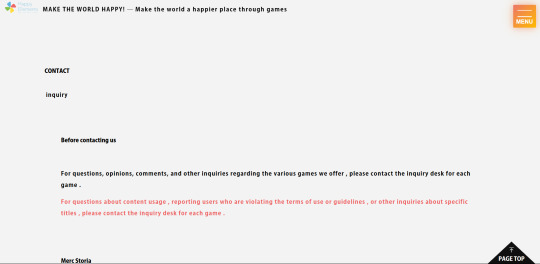
Scroll down until you hit the Ensemble Stars section (below, translated).

You can choose either Basic or Music to send an inquiry to - the process is the same (I suggest one to both, if you can). That will then lead you to this screen (below, translated).

Click the little box next to "agree" at the bottom of the page. That will then cause a drop down menu to appear at the top of the virtual paper. Click the last drop-down menu option - Opinions, requests, and feeback (below, translated).
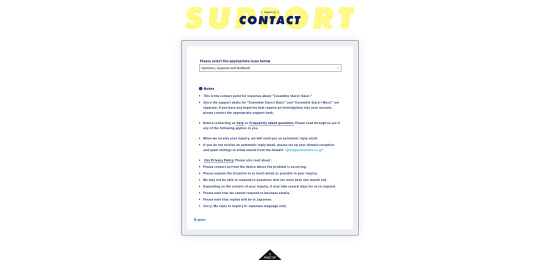
By selecting this option, you will automatically be directed to the actual inquiry form (below, translated).

From there, fill out the form. Put your email in the example box (I recommend using the same email as your JPstars account - if you don't have one, simply use whichever). Either keep the "-" in the optional reply box, or select "not desired", if you don't want a reply from support. In your inquiry box, you can either put your own inquiry fed through a translation machine (I recommend DeepL, and having a Japanese speaker look it over before sending if possible - be short, blunt, and professional!), or use the template inquiry I provide at the end of this post, which you can edit as you see fit! Creating your own inquiry in English is also an option, though you are more likely to get a reply through the English Happy Elements website (example inquiry below, translated page).
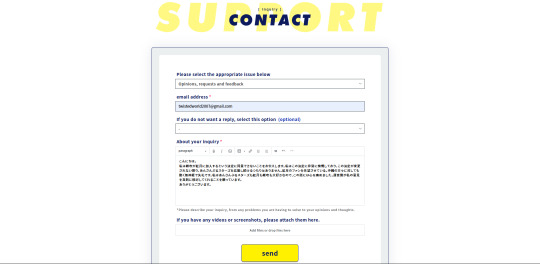
Make sure to click the box next to "agree" at the bottom of the page. Then, click send, and you're done!
Template Email:
こんにちは。
私は維吹が紅月に加入するという決定に同意できないことをお伝えします。私はこの決定に非常に憤慨しており、この決定が変更されない限り、あんさんぶるスターズを応援し続けるつもりはありません。紅月のファンを失望させている。沖縄の方々に対しても酷く無神経で失礼です。私はあんさんぶるスターズも紅月も維吹も大好きなので、この話には心を痛めました。運営側が私の意見を真剣に検討してくれることを願っています。
ありがとうございます。
Translation of Template Email:
"Hello.
I am writing to inform you that I disagree with the decision to have Ibuki join AKATSUKI. I am very upset that this choice was made, and will not continue to support Ensemble Stars unless it is changed. It is disappointing to fans of AKATSUKI. It is also very insensitive and disrespectful to the Okinawan people. I love Ensemble Stars, AKATSUKI, and Ibuki, and am heartbroken by this story. I hope the management will seriously consider my inquiry.
Thank you very much."
Other things you can mention:
Go into more detail about how offensive it is for Ibuki to join a Japanese unit, given his identity as an indigenous character.
Reiterate how much AKATSUKI's writing has emphasized that the unit is the three of them (I suspect this one won't receive much attention though, considering the story basically mocks the line of thinking :/)
Mention how much you spend on the game, and how much they would be losing. Especially effective if you spend a lot on an account linked to your inquiry email, and if you actually boycott (no playing or spending).
If you're a producer of Knights, Switch, Eden, or Valkyrie (units who have not had their center this rotation), you can say that you have decided not to tier or play for them now. Especially effective because three out of the four are big moneymakers (Knights being the biggest in the game), they're already on thin ice with Sora fans after VS GLADIATOR, and it's been several months since a lot of their producers have spent money tiering (17, in Valkyrie's case).
Really, anything you can do to get it through their heads is great, especially if you follow through and don't spend money or play the game for this time period.
-
I hope that this guide was informative, and that you are able to send a support ticket to Happy Elements regarding these events! For me, the one good thing to come out of this disaster was the support and solidarity I saw within the fandom, and while I may personally be stepping back from Enstars, I hope to encourage that energy how I can on my end.
Feel free to contact me with any questions or concerns in the comments, reblogs, my Neospring (Frostedonut6297) or my email ([email protected])! Sending love and support to everyone <3
#edit - updated some language to make it clear that you CAN send them an english inquiry! this is simply a guide for the jp website#enstars#ensemble stars#enstars akatsuki#keito hasumi#kuro kiryu#souma kanzaki#ibuki taki#ensemble stars music#happy elements#happyele#guide#resource#enstars guide#also edited typos in general - i was very tired when i made this
122 notes
·
View notes
Text
Silmarillion Survey Essay!
My essay was due last night (submitted it with 6 minutes to spare!) and my professor said I could post it to Tumblr if I wanted to. It's divided into four sections, all marked. The first section is the introduction where I explain the point of the survey, who I studied, and why. The second section is the methods I used to design the survey, get answers, record answers, and control for variables. The third section is results, where I highlight several of the questions I thought would be most stratifying and explain what I actually found (it has graphs!). The fourth section is the discussion where I talk about what I found and what conclusions I drew from that.
I'd love to hear all of your thoughts on the results and my conclusions!
Introduction
For this project, I looked into age (and length of time in fandom, in one case) affected knowledge and attitudes about fandom language. I investigated several terms and phrases, both from fandom at large and from the Silmarillion fandom specifically. The group I studied was the fandom of The Silmarillion on Tumblr because I am intimately familiar with that internet space (and could therefore phrase the questions in a way that would be understood) and because the majority of Archiveofourown.org (a popular fanfiction website) users are also Tumblr users.
For the purposes of this paper, I am defining the Silmarillion fandom as a community of practice. The Wenger-Trayner article, “Communities of practice a brief introduction”, defines a community of practice as an entity with three parts: domain, community, and practice. The domain is “an identity defined by a shared domain of interest” (Wenger-Trayner 2). The domain in this case is The Silmarillion. As The Silmarillion is a history book set in a fictional universe, it is incredibly dry at times (there is an entire chapter titled “Of Beleriand and its Realms” which deals mostly with geography) so anyone who reads it by choice is necessarily interested in the work. The second part, community, is made up of “members [that] engage in joint activities and discussions, help each other, and share information” (Wenger-Trayner 2). Most fandoms engage in discourse/discussion, create transformative art (mostly written or visual, but I have seen musical as well) and exchange craft advice to better each other’s creative work, but due to the almost academic nature of the Silmarillion fandom, we exchange background lore knowledge, additions to Tolkien’s conlangs, translations, timelines, and character sheets in addition to the regular fandom activities. Finally, the Silmarillion fandom also has a shared practice, defined as “They develop a shared repertoire of resources: experiences, stories, tools, ways of addressing recurring problems—in short a shared practice” (Wenger-Trayner 2). As mentioned above, the Silmarillion fandom has shared resources (such as tolkiengateway.net, Nerd of the Rings on YouTube, as well as several established “fandom elders” who are happy to answer questions), stories, established characterizations for “only-mentioned-once-in-a-footnote” type characters, settled linguistic debates, and several research-oriented blogs (such as two of my own) that record niche or new knowledge about either Tolkien’s work or the fandom itself. Almost all of the above (with the possible exception of the website and the youtuber previously mentioned) is unpaid hobby work.
When doing this survey, I expected to find a rather steep difference between older and younger members of fandom regarding their knowledge of fandom terminology. I expected the 18-25 age group to be the most knowledgeable of fandom terms with the under 18 group to be only slightly behind them and the 26-30 group a slightly further way behind the under 18 group. For the groups over 30, I anticipated that the rate of knowledge would sharply decline and that older fans would be unfamiliar with fandom terminology for the most part. I was… incorrect.
Methods
There are eight questions highlighted in this paper. The first chart (Figure 1.) is the total percentage of answers that amounted to “I don’t know”, filtered by age. The first table (Figure 2.) looks at the people who did not know the term “Isekai” based on whether or not they were native speakers of English or live in Asia (given that “Isekai” is a Japanese word). The second table (Figure 3.) compares the percentage of people who mentioned that the word “angst” is also present in everyday German, categorized by German speakers and non-German speakers. The third table (Figure 4.) examines attitudes towards the anti/pro-ship terms based on age. The second chart (Figure 5.) examines attitudes towards the term “omegaverse” separated by age. The fourth table (Figure 6.) compares groups of people who could define the difference between “peredhel” and “peredhil”, separated by how long they have participated in the fandom surrounding the Silmarillion fandom. The third chart (Figure 7a.) looks at people who understand the phrase “Fëanor did nothing wrong” as a joke, filtered by age. Finally, the fourth chart (Figure 7b.) shows the percentage of people who used the phrase “tongue-in-cheek” in the 31-40 group as opposed to other age groups (that one was not explicitly asked for in the survey; I simply noticed a steep trend while dissecting the results from the “Fëanor did nothing wrong” question).
I compiled all of these questions (along with several others) in a google form as a three-part survey. The first part was comprised of basic demographic questions, the second of general fandom terms and phrases, and the third of terms and phrases specific to fanfiction of The Silmarillion. The 418 responses were recorded and examined in Google sheets, which I used to filter the demographic information for ease of synthetization.
The group I examined was people who participate in the Silmarillion fandom on Tumblr. I chose this group because I am familiar with them, because they are the most likely to be aware of these terms (due to the large overlap between Tumblr and Archive Of Our Own), and because fandom language is (to the best of my knowledge) not well studied. I was able to isolate this group by only posting the survey to Tumblr itself. Tumblr posts are only viewable to Tumblr users, so even if someone were to post a link to the post elsewhere, the only people able to access the survey would be Tumblr users. I further attempted to control by including several fandom related and The Silmarillion-specific questions in the demographic portion of the survey. Anyone who completed the demographic portion would have been well aware of the nature of the survey by the end, regardless of how poorly they understood the original survey posting. These measures, of course, did not stop everyone. I had a few respondents who submitted only the demographic portion or the demographic and general fandom portions. Luckily, due to the Google Sheets functions, such responses were relatively easy to filter out.
Results
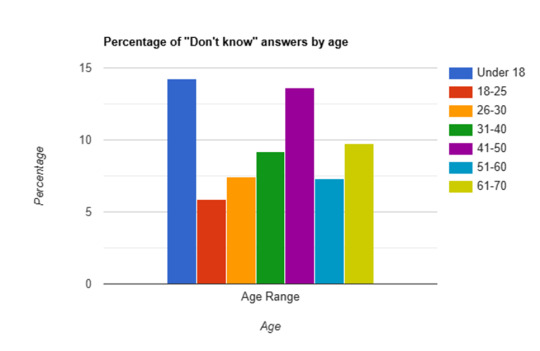
(Figure 1. A chart observing, out of all 16,065 answers, how many equate to “I don’t know?” Under 18: 14.24%, 18-25: 5.9%, 26-30: 7.43%, 31-40: 9.17%, 41-50: 13.63%, 51-60: 7.3%, 61-70: 9.7%)

(Figure 2. A table comparing different categories of people and what percentage of them are unfamiliar with the term “Isekai”; a Japanese term which is most commonly defined as “a trope in which a character somehow travels from the mundane ‘real’ universe into a fictional one.” 23.08% of native English speakers are unfamiliar with the term. 27.07% of non-native English speakers are unfamiliar with the term. 20% of respondents who live in Asia are unfamiliar with the term.)

(Figure 3. A table comparing different categories who mention that “Angst” (defined in fandom context as “dramatic, serious, and sometimes dark”) is an everyday word in German. 12.73% of German speakers mentioned it. 1.38% of people who either do not speak German, or did not mention it in their language background, mentioned it.)

(Figure 4. A table comparing the attitudes of different age groups to the terms “anti-ship” and “pro-ship”. These terms are hotly debated in fandom. Those on the anti side of the debate define anti-ship as “being morally against abuse and pedophilia,” and pro-ship as “excusing abuse and pedophilia in fandom.” Those on the pro side of the debate define anti-ship as “puritanical and chronically online people who can’t separate reality and fiction” and pro-ship as “letting people ship whatever they want and separating reality from fiction.” Those under 18 are 4% anti, 4% pro, and 92% neutral. Those from 18-25 are 2.44% anti, 29.27% pro, and 68.29% neutral. Those from 26-30 are 0% anti, 33.67% pro, and 66.33% neutral. Those from 31-40 are 2.2% anti, 26.37% pro, and 71.43% neutral. Those from 41-50 are 0% anti, 46.15% pro, and 53.85% neutral. Those from 51-60 are 12.5% anti, 37.5% anti, and 50% neutral. Those from 61-70 are 0% anti, 50% pro, and 50% neutral (although, admittedly, there are only two respondents in that group.))
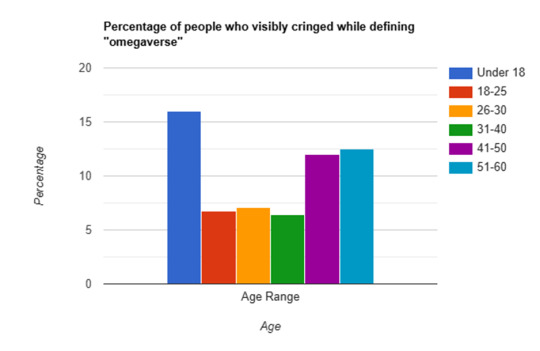
(Figure 5. A chart that shows the rate at which respondents cringed (using phrases such as “please don’t make me define this,” “oh god,” and “Nuh uh. Sorry man. Sweet baby rays good lord.”*) within their responses while defining “Omegaverse” (an erotica subgenre within fandom based on outdated wolfpack dynamics. Very popular, but also very taboo). Under 18: 16%, 18-25: 6.71% 26-30: 7.07%, 31-40: 6.45%, 41-50: 12%, 51-60: 12.5%)
*All real responses I received
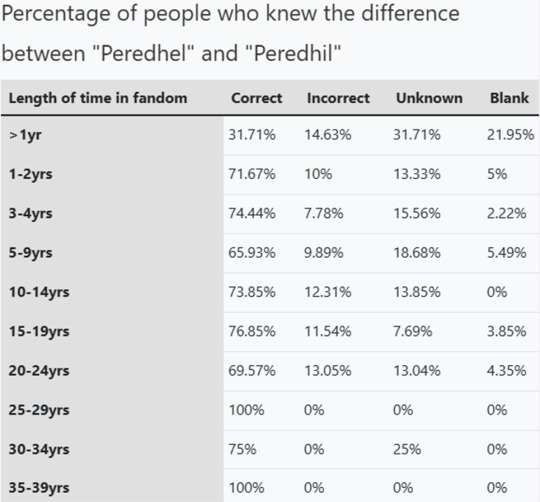
(Figure 6: A chart exploring the differences between who can correctly identify the difference between the terms “peredhel” (half-elf, singular) and “peredhil” (half-elves, plural) based on how long they have been in the fandom. Those who have been in the fandom for less than a year are 31.71% correct and 14.63% incorrect. Those who have been in the fandom for 1-2 years are 71.67% correct and 10% incorrect. Those who have been in the fandom for 3-4 years are 74.44% correct and 7.78% incorrect. Those who have been in the fandom for 5-9 years are 65.93% correct and 9.89% incorrect. Those who have been in the fandom for 10-14 years are 73.85% correct and 12.31% incorrect. Those who have been in the fandom for 15-19 years are 76.92% correct and 11.59% incorrect. Those who have been in the fandom for 20-24 years are 69.57% correct and 13.04% incorrect. Those who have been in the fandom for 25-29 years are 100% correct and 0% incorrect. Those who have been in the fandom for 30-34 years are 75% correct and 0% incorrect. Those who have been in the fandom for 35-39 years are 100% correct and 0% incorrect.)
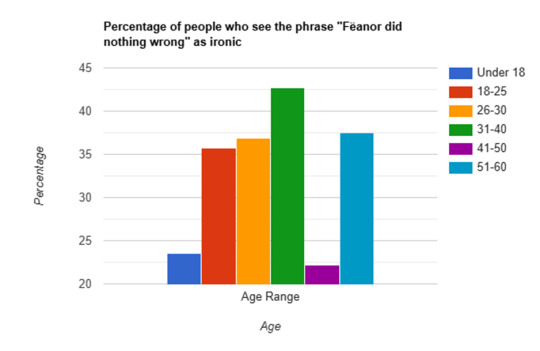
(Figure 7a. A chart observing who sees the phrase “Fëanor did nothing wrong as ironic” divided by age. Under 18: 23.53%, 18-25: 35.77%, 26-30: 36.9%, 31-40: 42.67%, 41-50: 22.22%, 51-60: 37.5%)
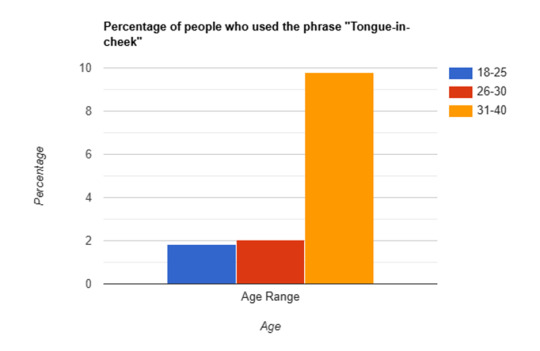
(Figure 7b. A chart observing the percentages of age groups who used the phrase “tongue-in-cheek” while answering the above question. 18-25: 1.84%, 26-30: 2.04%, 31-40: 9.78)
Discussion
Observing these results, I can see that, while there is some level of stratification by age and length of time spent in the fandom, it is not nearly as dramatic as I had expected it to be. These results strongly demonstrate the power of communities of practice. These people, across ages and continents, communicate so often and so deeply, that nearly all terms are understood to the same degree by everyone, and nearly everyone has similar stances on divisive pan-fandom debates.
Were I to do this study again, or a similar study in the future, I would probably narrow the purview by a lot. I would ask fewer questions (or at least, only ask questions of a single type), compare them against only one demographic question, and sincerely consider making them multiple choice. That being said, I do not regret this survey having short answer questions. There were several definitions of several terms that I never could have come up with in a million years. Synthesizing the short answers may have taken more effort on my part, but I learned a lot about my fandom.
@proship-anti-discussion (ship debate was mentioned)
#silmarillion#fandom#linguistics#survey says#silmarillion survey#fandom survey#academia#nerd shit#graphs#charts#tables#isekai#angst#antishiping#proshipping#omegaverse#peredhel#peredhil#feanor#fëanor#fëanor did nothing wrong#fandom discourse#fandom meta
82 notes
·
View notes
Text
apps we use as a system!!!
1) Picrew!
Picrew is an avatar maker with literally thousands upon thousands of different makers!! It has a website (picrew.me) OR an app on google play!!
Pros: It's made completely by users, so it has tons of different art styles!! It's also just really fun ww
Cons: The app can be a bit laggy, and the website has lots of ads for hentai games :(
2) Simply Plural!
It's an app designed for systems!!! SOOO easy to use and the accessible fonts and interface settings are really nice! We use it not just to track fronts but also to increase communication and honestly just allow ourselves to be ourselves.
Pros: Easy interface, you can set it to send notifications to track fronts, no alter limit which is great for polyfrag systems, the chat feature is awesome, and the new custom fields allow us to put in a lot more info
Cons: It supports endos and has misinformation which can be harmful for newly discovered systems trying to learn more about their disorder
3) Mininote
Mininote is a very coquette scrapbook/journaling app! It's really cute and easy to use, plus you can have multiple journals.
Pros: most features are free, with most of the paid ones being just cosmetic. You can customize the journals however you want and even have different passwords on them for different alters, and it lets you have lots of journals. Very simple UI.
Cons: The font might be a bit difficult for some systems to read and it tends to prioritize aesthetics over functionality. It also wasn't designed for systems, so it might have a limit on how many journals one can have. The translation from the app's native language (Chinese) is very patchy and poorly done, so it can be a little difficult to navigate.
4) Twinote
Twinote is very popular among systems! It's basically a Twitter simulator, but the feed and all the user profiles are one account. It still functions mostly the same as Twitter, just only with what you post... like your own personal Twitter!
Pros: Fun to use! It lets you customize EVERYTHING, from the number of followers you have to the likes on any post. Unlimited users, too! It also helps us with our communication and lets us send each other images, whereas the SP chat doesn't.
Cons: Nothing too major. It doesn't give notifications, so you have to manually check for that sort of thing. It's also not made for systems and instead for fun, so the UI is built for singlets.
5) Mindly
Mindly is a mind-mapping and organization tool that we use to map out innerworld!
Pros: Very simple! It's literally just adding and labeling little bubbles! It also allows for layers, which is amazing for polyfrag systems!
Cons: It was built for, you guessed it, singlets. Mind-mapping is, from what I gathered, similar to using a planner, so using the app to LITERALLY map your mind isn't its main purpose. It can also take a while.
6) Matterport
Matterport isa sort of 3d modeling app designed to make schematics of houses and stuff like that. We use it to visually map out our innerworld since we have a hard time visualizing it due to our NVLD!
Pros: It's great for systems trying to create a headspace or who, like us, struggle to maintain it! It's highly customizable and free!
Cons: It was designed for architects and interior designers, making it a bit more difficult to learn. It's 3d modeling app, which can always be hard, and also makes it a bit of a bulky app, which can run down your battery and lag. I believe there's also a lot of paid features, but I may be wrong.
#the hollow system#system stuff#did#did osdd#actually a system#anti endo#did system#system help#endos dni#systempunk#syspunk
41 notes
·
View notes
Text
helpful hint for non-Norwegians streaming Rykter
several youtube channels have posted translations of S1, S2, and S3 with English subtitles. here’s one example:
but for the upcoming season, if you don’t speak Norsk and still want to stream the episodes as soon as they premiere, read below!
i recommend using the NRK dual subtitles chrome extension!!
step 1. add this extension to your chrome browser
step 2. access the episode on NRK’s website using your preferred VPN to bypass the geoblock
step 3. click the extension and choose your preferred language
step 4. turn on captions and press play. the Norsk subtitles will appear side by side with your preferred language in real time

i have used this with other shows as a language learning tool and find the translations to be fair quality. occasionally the translator will throw a wrong word in, especially with slang words, different dialects, etc. but in my experience they are usually descent enough to get the major plot points of the episode even if you don’t speak the language!!
hope this helps y’all and happy streaming :)
104 notes
·
View notes
Text
List of Telugu learning Resources
Writing
Script: about, history and development, impact of writing tools in its evolution
Alphabet: multibhashi, wikipedia, wikibooks, edzym
Reading
Textbook: intensive course (archive.org), ncert school books, ap scert school books, ts scert school books, hindi-telugu praimaru, grammar (written in telugu)
Prose: kids’ stories, stories, collected manuscripts, parikini, soundaryalahari, barrister parvateesam, history, translated quran,
Poetry: kinnerasani patalu, movie songs book, maha prasthanam, tyagaraja kirtanalu
Blog/Misc: chandamama kathalu magazine, kavithalu, saaranga magazine, hasam magazine, bharati magazine, swathi weekly, sakshi news
Dictionaries: andhrabharati, tel-eng by sankaranarayana, eng-tel by venkatacharyulu, tel-eng by percival, tel-sans, hin-tel.
Vocabulary
MyLanguages
MeaningInHindi
1000MostCommonWords
proverbs: sametalu (written in telugu)
Grammar
malik’s absolutely goated guide
praveen ragi
vakyam (written in telugu)
Apps
Mango
Multibhashi (android)
HelloTalk
Dasubhashitam (android)
Learn Spoken Telugu From English (android)
Websites
Languages Home
Goethe-Verlag
LearningTelugu
Learn 101
Desi Bantu
YouTube - Native
Telugu teachers: telugu vanam, teach me telugu, pr learning hub,
Beginner level/Kids content: koo koo tv, jum jum tv, paa paa tv, horror planet
General: permit room, sumakka, chai bisket, naa anveshana, my vilage show, ragadi, chitra alochana, thyview, mahathalli, vikramaditya, yevarra meerantha, aye jude, dhethadi, chari not sorry
YouTube - Learners
Mexico: Christina
USA: Kari, Isaac Richards, Manasa (Danya), Omar Crockett
Italy: Franchesca /Telugutalian
Denmark: BigAReact
Poland: Zbigsbujji Chetlur
Sweden: Karl Svanberg
Online Keyboards
lexilogos
typingbaba
branah
gate2home
#telugu langblr#telugu#langblr#language study#masterlist#literature#indian literature#poetry#language history#etymology#language#langblog#language community#desi academia#indian languages#south indian
105 notes
·
View notes
Text
Okay, I was reading Pseudo-Apollodorus' Library 3.13.8 and thinking about some things….
This is J.G. Frazer's translation:
[...] At Opus, in a quarrel over a game of dice, Patroclus killed the boy Clitonymus, son of Amphidamas, and flying with his father he dwelt at the house of Peleus and became a minion of Achilles...
The Greek text provided in the same edition for this part is:
[...] οὗτος ἐν Ὀποῦντι διενεχθεὶς ἐν παιδιᾷ περὶ ἀστραγάλων παῖδα Κλειτώνυμον τὸν Ἀμφιδάμαντος ἀπέκτεινε, καὶ φυγὼν μετὰ τοῦ πατρὸς παρὰ Πηλεῖ κατῴκει, καὶ Ἀχιλλέως ἐρώμενος γίνεται...
Note: "…" was placed to indicate a lacuna in the text. A note on the Loeb website in the Greek text (note 3) says "Heyne was probably right in marking a lacuna here".
In the Greek text of Camargo's edition, we have:
[...] οὗτος ἐν Ὀποῦντι διενεχθεὶς ἐν παιδιᾷ περὶ ἀστραγάλων παῖδα Κλειτώνυμον τὸν Ἀμφιδάμαντος ἀπέκτεινε, καὶ φυγὼν μετὰ τοῦ πατρὸς παρὰ Πηλεῖ κατῴκει, καὶ Ἀχιλλέως ἐρώμενος
From what I understand, the part "became a minion of Achilles" is a translation for "Ἀχιλλέως ἐρώμενος γίνεται". Maybe I misunderstood, but "minion" here would be a translation for "ἐρώμενος". I went to look up what that word was, thinking that maybe it was "servant" or something like that in the sense of "minion". But then I saw this:


By the way, this is from the Perseus Library tool. On Google, this was the first search result:

J.G. Frazer was from 1854-1941, so the idea that he would deliberately change the word "lover" to "minion" in this particular context wouldn't be at all surprising. So I checked some other more recent translations.
Translated by R. Scott Smith (2007):
[...] In Opous he had had an argument about dice while playing a game and had killed Cleitonymos son of Amphidamas. He went into exile with his father, settled at the court of Peleus, and became Achilles’ boyfriend.
Translated by Robin Hard (2008):
[...] At Opous, during an argument over a game of knucklebones, Patroclos had killed a boy, Cleitonymos, son of Amphidamas, and had fled with his father to live at the court of Peleus, where Achilles had become his lover.
I wanted to see how it was going in my native language.
Translated by Luiz Alberto Machado Cabral (2013):
[...] Em Opunte, quando altercavam a propósito de um jogo de dados, Pátroclo matou Clitônimo, filho de Anfidamas, e tendo fugido com seu pai, passou a morar na casa de Peleu e tornou-se amante de Aquiles.
Translated by Caio Vieira Reis de Camargo (2016):
[...] Em Opunte, numa disputa no jogo de dados, Pátroclo matou Clitônimo, filho de Anfidamas. Fugindo com seu pai, foi morar com Peleu e se tornou amado de Aquiles.
Amante = lover.
Amado = loved one/beloved.
So, even though I don't know Greek, apparently this whole time Pseudo-Apollodorus was explicitly stating that they were lovers, but since I had only seen J.G.'s edition, I had never seen this before. I know a considerable amount of sources where they are explicitly lovers and I never knew I should include Pseudo-Apollodorus among those sources lol. Anyway, the problems of reading very old translations…even when they are very good, sometimes we have things like that.
27 notes
·
View notes
Text
Weekend links, June 8, 2025
My posts
Seasonal reblog: a post about Donna Summer and Disco Demolition Night.
I seem to have crashed a bit and taken a week I couldn't really spare to rest a little (while still going to physical therapy three times). This compilation of Maria getting in my way for five and half minutes shows a bit of the next SH2 commentary, but that's about as far as I've gotten.
I am now developing quite a little Steam library of deep-discount games I have no time to play, as is traditional. This week I learned that the Epic platform is a thing, and also that it has Alan Wake 2 as an exclusive, or else I would own the latter by now. The rest of Alan Wake, I got for $5. When will I play all these games? Nobody knows, including my physical therapist who wants me to get up and stretch every fifteen minutes.
Meanwhile, Ian's band has a new YouTube channel; he talks about a special song here. He doesn't know when I have time to play these games either; he's the one who got me to buy Silent Hill 4 off GOG.com.
Reblogs of interest
Remembering Marsha P. Johnson, Stonewall, and her activism (I hadn't seen the Pay It No Mind arch before; it's beautiful).
Remembering muppeteer Richard Hunt ("he originated the characters of Scooter, Beaker, Statler, Sweetums, and Wayne, but also became the primary performer of Janice and is responsible for the flower child personality she is now known for"), a joyous performer lost to AIDS in 1992.
Sir Ian McKellen on the trans community: "The connection between us all is we come under the queer umbrella – we are queer. [...] The problems that transgender people have with the law are not dissimilar from what used to be the case for us, so I think we should all be allies really."
Writings on what queer masculinity can be
Aro Books For Pride
Community support isn't rainbow capitalism
Disability aids from Active Hands (here's the website; I haven't tried their products, but the posters are very happy with them)
A tale of two Mondays: sweet and beautiful and weary of life at age 0.
(Not What I'm Called: Manul Edition)
"Builder.AI just declared bankruptcy after admitting that they were faking their AI tool with 700 humans"
CatGPT is just as reliable.
Xuanji Tu, the Chinese poem that can be read 8,000 ways
"sometimes you just want to look at the qing dynasty jadeite cabbage again"
Poll: Which setting is sexier, lighthouse or clock tower?
Tallulah Bankhead: blonde and ambisextrous
Beautifully colored dice, and also, it's a painting
Always reblog the sunwoof
Out-of-focus summer fun
Perfectly synchronized with mama (I realized that "let's eat shit with mama" isn't something you say out of context)
Two very different artistic kinds of bats
The majestic Steller's jay (not sarcasm)
I should not exclude the Swedish blue tit
Pride for one thousand years
Video
New gameplay trailer for Silent Hill f; it looks hard as fuck and twice as scary. I watched it again and said, ".....I bet I could do that," which is how we know that gaming has fully eaten my brain.
Happy Los Jibbities!
I don't know why this made me laugh so hard, but it IS very ewok-coded, yes
Puzzle the tree kangaroo loves cauliflower. Our lives are so rich
Now, this starts off as a discussion of sign language in a production of Hamilton, but ends up as a master class on translating "Not Like Us" to ASL
The sacred texts
"MY NAME, IS FRICKIN MOON MOON"
Personal tag of the week
Let's say House of Leaves, because I never get tired of house jokes.
16 notes
·
View notes
Note
staring so kindly at your sluglang post,, as someone working on a language as well this looks fantastic (and is also. super organized compared to mine BHAHAH) Any tips for putting together a language? Like resources on how to go about it, or notes? /genq
You are staring kindly... (thank you)
As for tips... Wikipedia is actually one of my biggest, most useful tools, because I love to read articles about grammatical concepts, and they will usually have a varaiety of examples of use if you can figure out how to parse the academic language. There are some core ideas that pop up all over the place crosslinguistically, like case marking or converbs, and you can get a lot from learning how other languages might parse the same idea, both how they handle the idea grammatically and what kind of metaphorical language might be involved; like how in Scottish Gaelic, to say you have something, you say it's 'at' you, or how it doesn't have an exact equivalent of English's infinitive, or how Mongolian has so many word endings that convey meaning, and a bunch of them are literally endings stacked on top of other endings.
There's also really good conlang youtubers, like David Peterson, the one who made Dothraki and other pop media conlangs, Artifexian, Biblaridion. They have videos on both interesting grammatical concepts that don't exist in english AND how to integrate them into conlangs. Davide Peterson especially has interesting videos on things like sound changes, vowel harmony, phonological concepts that can really help shape your language and bring a degree of naturalism if that's what you're looking for.
Etymology can be extremely informative though, and really help you to understand exactly how creative people have gotten with language over the past thousands of years. Etymonline is a great website for that. Did you know that the word "next" was originally literally "nearest"? Or that that the suffix "be-" was originally "by", so words like "before" actually meant "by the fore", and very often these meanings are metaphorically extended to the way we use them today. It's great for helping to develop very important words that can be structural to your language, so that you're not just trying to raw make up a new word with no basis every time.
Aside from that, there's no single source I go to for making conlangs. Everything is on a case by case basis. Something that has been really helpful for me is constantly writing example sentences and finding things to write about, because similar to translating existing texts, it forces me to reckon with the way my conlang works, figure out how to convey certain ideas (or whether or not the language can convey the idea at all).
Usually I'll have a few languages that I keep in mind for inspiration for any given project and if I'm stumped or need an idea, I'll actually look up learning resources for those languages. My slugcat language has had me looking up a lot of "How to say..." in Korean, Arabic, Japanese Filipino, a little bit of Indonesian? Some Russian for verb stuff. Once I find resources, I spend a bit of time dissecting how it works in those languages and figure out how that can fit in the existing framework of my own project, or if it's something I'd even want in the project at all.
Once I have an idea, I'll just start iterating on it, usually on paper, basically brainstorming how the sentence structure and sounds might work until I find something that is both sonically satisfying and logically sound within the existing framework. If I'm feeling extra spicy, I might try to consider how the culture and priorities of the speakers might shape the development of the language. The important thing while doing this is, just like brainstorming, to be unafraid to keep throwing ideas onto the page no matter how unviable or nonsensical it may seem in your head. You NEED to experiment and find what doesn't work or else your brain will be too clogged to find out what does. Exercising your pen will help you get into the mindset of someone using the language (because you are), it'll help you form connections to other parts of the language you've already developed, and once you've developed enough, the language will almost start writing itself.
I've actually had some really interesting interactions happen my scuglang between the archaic system of suffixes, the position word system, and the triconsonantal root system, which actually gave rise to an entire system of metaphorical extension, letting speakers use phrases like "at a crossing of" or "at a leaving of" to mean across or away and also talk about concurrent events like "He talked while eating noodles" (He, at an eating of noodles, talked).
Anyway, I know I got kind of scattered but these are some of the big parts of how I approach conlanging! If I have questions or needs, I look to other languages, find learning resources, apply it, and then ask more questions. Spend time with your language and get familiar with it. There's the time I read "Ergativity" by Robert Dixon, but reading literal textbooks is not a requirement for conlanging. You just need to chip away at it and keep asking question.
Here's some photos of my own conlanging notes so you can see how serious I am when I say iterating and brainstorming are extremely helpful. You need to be throwing shit on the paper. I will handwrite three pages just to contradict myself on the next because those three pages were important for forming the final idea.
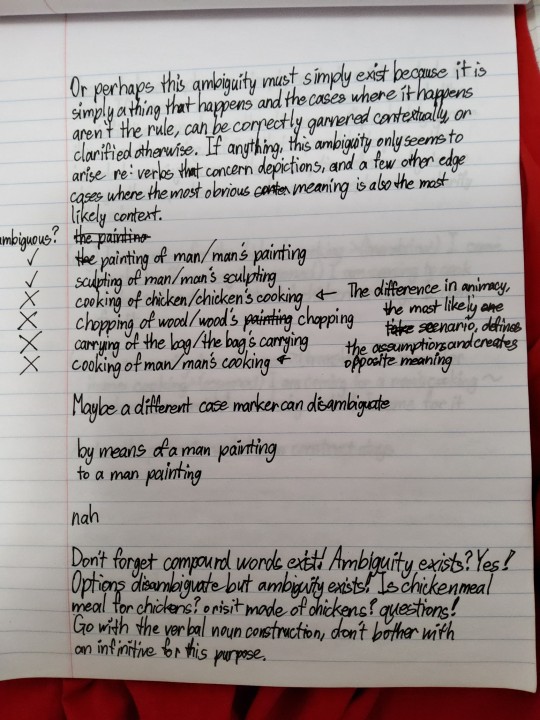
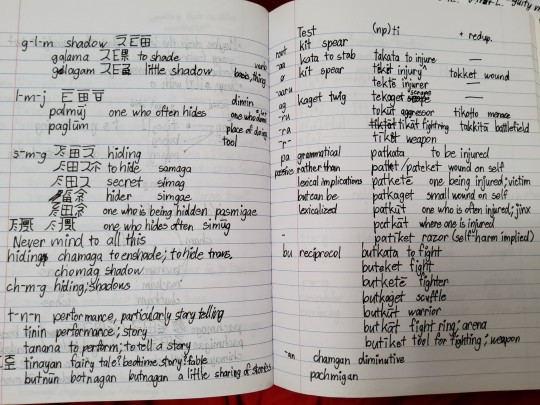

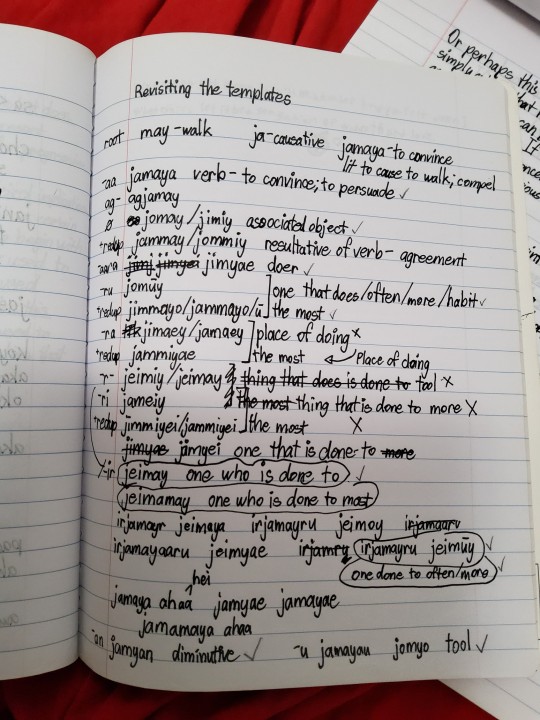
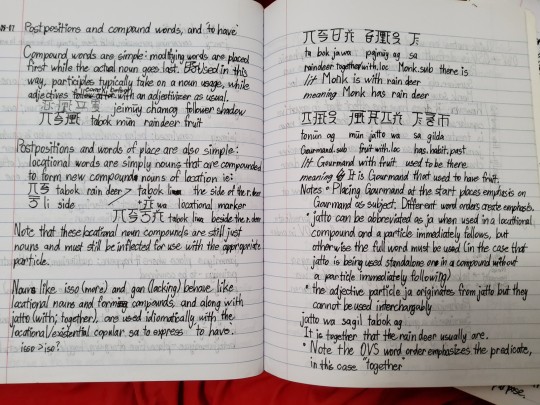
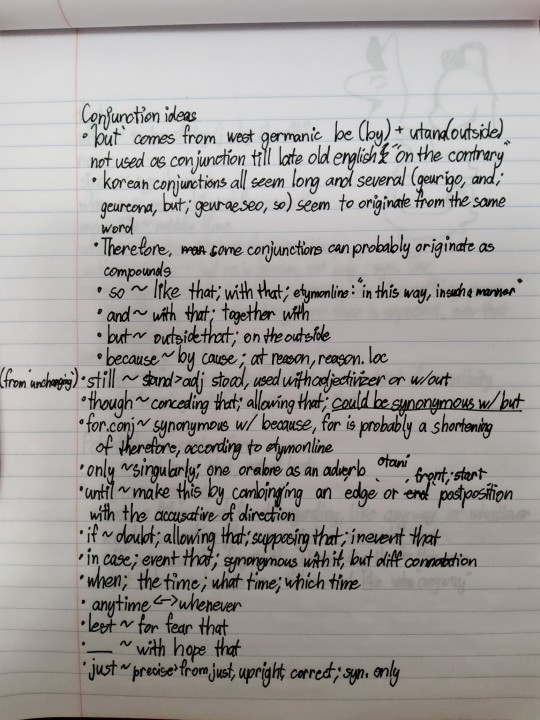

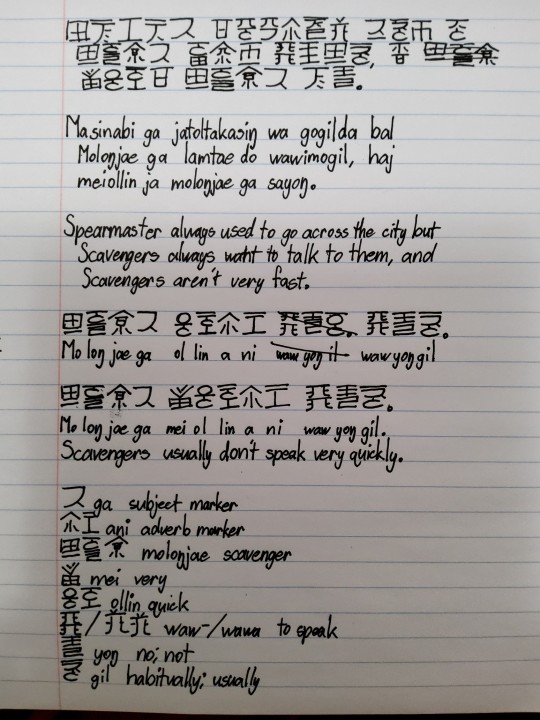
68 notes
·
View notes
Text
it's time for the long-threatened post about how to get subtitles (including translated ones) for videos that don't have subtitles.
in my experience, the methods in this post can probably get you solidly 75% or more of the content of many videos (caveats inside). i've tested this on videos that are originally in chinese, english, french, german, hindi, japanese, korean, spanish, and honestly probably some languages that i'm forgetting. my experience is that it works adequately in all of them. not great, necessarily, but well enough that you can probably follow along.
this is a very long post because this is the overexplaining things website, and because i talk about several different ways to get the captions. this isn't actually difficult, though, or even especially time consuming—the worst of it is pushing a button and ignoring things for a while. actual hands-on work is probably five minutes tops, no matter how long the video is.
i've attempted to format this post understandably, and i hope it's useful to someone.
first up, some disclaimers.
this is just my experience with things, and your experience might be different. the tools used for (and available for) this kind of thing change all the time, and if you're reading this six months after i wrote it, your options might be different. this post is probably still a decent starting place.
background about my biases in this: i work in the creative industries. mostly i'm a fiction editor. i've also been a writer, a technical editor and writer, a transcriptionist, a copyeditor, and something i've seen called a 'translation facilitator' or 'rewrite editor', where something is translated fairly literally (by a person or a machine) and then a native speaker of the target language goes through and rewrites/restructures as needed to make the piece read more naturally in the target language. i've needed to get information out of business meetings that were conducted in a language i didn't speak, and have done a lot of work on things that were written in (or translated into) the writer's second or sixth language, but needed to be presented in natural english.
so to start, most importantly: machine translation is never going to be as good as a translation done by an actual human. human translators can reflect cultural context and nuanced meanings and the artistry of the work in a way that machines will never be able to emulate. that said, if machine translation is your only option, it's better than nothing. i also find it really useful for videos in languages where i have enough knowledge that i'm like, 75% sure that i'm mostly following, and just want something that i can glance at to confirm that.
creating subs like this relies heavily on voice-to-text, which—unfortunately—works a lot better in some situations than it does in others. you'll get the best, cleanest results from videos that have slow, clear speech in a 'neutral' accent, and only one person speaking at a time. (most scripted programs fall into this category, as do many vlogs and single-person interviews.) the results will get worse as voices speed up, overlap more, and vary in volume. that said, i've used this to get captions for cast concerts, reality shows, and variety shows, and the results are imperfect but solidly readable, especially if you have an idea of what's happening in the plot and/or can follow along even a little in the broadcast language.
this also works best when most of the video is in a single language, and you select that language first. the auto detect option sometimes works totally fine, but in my experience there's a nonzero chance that it'll at least occasionally start 'detecting' random other languages in correctly, or someone will say a few words in spanish or whatever, but the automatic detection engine will keep trying to translate from spanish for another three minutes, even tho everything's actually in korean. if there's any way to do so, select the primary language, even if it means that you miss a couple sentences that are in a different language.
two places where these techniques don't work, or don't work without a lot of manual effort on your part: translating words that appear on the screen (introductions, captions, little textual asides, etc), and music. if you're incredibly dedicated, you can do this and add it manually yourself, but honestly, i'm not usually this dedicated. getting captions for the words on the screen will involve either actually editing the video or adding manually translated content to the subs, which is annoying, and lyrics are...complicated. it's possible, and i'm happy to talk about it in another post if anyone is interested, but for the sake of this post, let's call it out of scope, ok? ok. bring up the lyrics on your phone and call it good enough.
places where these techniques are not great: names. it's bad with names. names are going to be mangled. resign yourself to it now. also, in languages that don't have strongly gendered speech, you're going to learn some real fun stuff about the way that the algorithms gender things. (spoiler: not actually fun.) bengali, chinese, and turkish are at least moderately well supported for voice-to-text, but you will get weird pronouns about it.
obligatory caveat about ai and voice-to-text functionality. as far as i'm aware, basically every voice-to-text function is ~ai powered~. i, a person who has spent twenty years working in the creative industries, have a lot of hate for generative ai, and i'm sure that many of you do, too. however, if voice-to-text (or machine translation software) that doesn't rely on it exists anymore, i'm not aware of it.
what we're doing here is the same as what douyin/tiktok/your phone's voice-to-text does, using the same sorts of technology. i mention this because if you look at the tools mentioned in this post, at least some of them will be like 'our great ai stuff lets you transcribe things accurately', and i want you to know why. chat gpt (etc) are basically glorified predictive text, right? so for questions, they're fucking useless, but for things like machine transcription and machine translation, those predictions make it more likely that you get the correct words for things that could have multiple translations, or for words that the software can only partially make out. it's what enables 'he has muscles' vs 'he has mussels', even though muscles and mussels are generally pronounced the same way. i am old enough to have used voice to text back when it was called dictation software, and must grudgingly admit that this is, in fact, much better.
ok! disclaimers over.
let's talk about getting videos
for the most part, this post will assume that you have a video file and nothing else. cobalt.tools is the easiest way i'm aware of to download videos from most sources, though there are other (more robust) options if you're happy to do it from the command line. i assume most people are not, and if you are, you probably don't need this guide anyhow.
i'm going to use 'youtube' as the default 'get a video from' place, but generally speaking, most of this works with basically any source that you can figure out how to download from—your bilibili downloads and torrents and whatever else will work the same way. i'm shorthanding things because this post is already so so long.
if the video you're using has any official (not autogenerated) subtitles that aren't burned in, grab that file, too, regardless of the language. starting from something that a human eye has looked over at some point is always going to give you better results. cobalt.tools doesn't pull subtitles, but plugging the video url into downsub or getsubs and then downloading the srt option is an easy way to get them for most places. (if you use downsub, it'll suggest that you download the full video with subtitles. that's a link to some other software, and i've never used it, so i'm not recommending it one way or the other. the srts are legit, tho.)
the subtitle downloaders also have auto translation options, and they're often (not always) no worse than anything else that we're going to do here—try them and see if they're good enough for your purposes. unfortunately, this only works for things that already have subtitles, which is…not that many things, honestly. so let's move on.
force-translating, lowest stress mode.
this first option is kind of a cheat, but who cares. youtube will auto-caption things in some languages (not you, chinese) assuming that the uploader has enabled it. as ever, the quality is kinda variable, and the likelihood that it's enabled at all seems to vary widely, but if it is, you're in for a much easier time of things, because you turn it on, select whatever language you want it translated to, and youtube…does its best, anyhow.
if you're a weird media hoarder like me and you want to download the autogenerated captions, the best tool that i've found for this is hyprscribr. plug in the video url, select 'download captions via caption grabber', then go to the .srt data tab, copy it out, and paste it into a text file. save this as [name of downloaded video].[language code].srt, and now you have captions! …that you need to translate, which is actually easy. if it's a short video, just grab the text, throw it in google translate (timestamps and all), and then paste the output into a new text file. so if you downloaded cooking.mp4, which is in french, you'll have three files: cooking.mp4, cooking.fr.srt, and cooking.en.srt. this one's done! it's easy! you're free!
but yeah, ok, most stuff isn't quite that easy, and auto-captioning has to be enabled, and it has some very obvious gaps in the langauges it supports. which is sort of weird, because my phone actually has pretty great multilingual support, even for things that youtube does not. which brings us to low-stress force translation option two.
use your phone
this seems a little obvious, but i've surprised several people with this information recently, so just in case. for this option, you don't even need to have downloaded the video—if it's a video you can play on your phone, the phone will almost definitely attempt real-time translation for you. i'm sure iphones have this ability, but i'm an android person, so can only provide directions for that: go into settings and search for (and enable) live translation. the phone will do its best to pick up what's being said and translate it on the fly for you, and if 'what's being said' is a random video on the internet, your phone isn't gonna ask questions. somewhat inexplicably, this works even if the video is muted. i do this a lot at like four a.m. when i'm too lazy to grab earbuds but don't want to wake up my wife.
this is the single least efficient way to force sub/translate things, in my opinion, but it's fast and easy, and really useful for those videos that are like a minute long and probably not that interesting, but like…what if it is, you know? sometimes i'll do this to decide if i'm going to bother more complicated ways of translating things.
similarly—and i feel silly even mentioning this, but that i didn't think of it for an embarrassingly long time—if you're watching something on a device with speakers, you can try just…opening the 'translate' app on your phone. they all accept voice input. like before, it'll translate whatever it picks up.
neither of these methods are especially useful for longer videos, and in my experience, the phone-translation option generally gives the least accurate translation, because in attempting to do things in real time, you lose some of the predicative ability that i was talking about earlier. (filling in the blank for 'he has [muscles/mussels]' is a lot harder if you don't know if the next sentence is about the gym or about dinner.)
one more lazy way
this is more work than the last few options, but often gives better results. with not much effort, you can feed a video playing on your computer directly into google translate. there's a youtube video by yosef k that explains it very quickly and clearly. this will probably give you better translation output than any of the on-the-fly phone things described above, but it won't give you something that you can use as actual subs—it just produces text output that you can read while you watch the video. again, though, really useful for things that you're not totally convinced you care about, or for things where there aren't a lot of visuals, or for stuff where you don't care about keeping your eyes glued to the screen.
but probably you want to watch stuff on the screen at the same time.
let's talk about capcut!
this is probably not a new one for most people, but using it like this is a little weird, so here we go. ahead of time: i'm doing this on an actual computer. i think you probably can do it on your phone, but i have no idea how, and honestly this is already a really long guide so i'm not going to figure it out right now. download capcut and put it on an actual computer. i'm sorry.
anyhow. open up capcut, click new project. import the file that you downloaded, and then drag it down to the editing area. go over to captions, auto captions, and select the spoken language. if you want bilingual captions, pick the language for that, as well, and the captions will be auto-translated into whatever the second language you choose is. (more notes on this later.)
if i remember right, this is the point at which you get told that you can't caption a video that's more than an hour long. however. you have video editing software, and it is open. split the video in two pieces and caption them separately. problem solved.
now the complicated part: saving these subs. (don't panic; it's not actually that complicated.) as everyone is probably aware, exporting captions is a premium feature, and i dunno about the rest of you, but i'm unemployed, so let's assume that's not gonna happen.
the good news is that since you've generated the captions, they're already saved to your computer, they're just kinda secret right now. there are a couple ways to dig them out, but the easiest i'm aware of is the biyaoyun srt generator. you'll have to select the draft file of your project, which is auto-saved once a minute or something. the website tells you where the file is saved by default on your computer. (i realised after writing this entire post that they also have a step-by-step tutorial on how to generate the subtitles, with pictures, so if you're feeling lost, you can check that out here.)
select the project file titled 'draft_content', then click generate. you want the file name to be the same as the video name, and again, i'd suggest srt format, because it seems to be more broadly compatible with media players. click 'save to local' and you now have a subtitle file!
translating your subtitles
you probably still need to translate the subtitles. there are plenty of auto-translation options out there. many of them are fee- or subscription-based, or allow a very limited number of characters, or are like 'we provide amazing free translations' and then in the fine print it says that they provide these translations through the magic of uhhhh google translate. so we're just going to skip to google translate, which has the bonus of being widely available and free.
for shorter video, or one that doesn't have a ton of spoken stuff, you can just copy/paste the contents of the .srt file into the translation software of your choice. the web version of google translate will do 5000 characters in one go, as will systran. that's the most generous allocation that i'm aware of, and will usually get you a couple minutes of video.
the timestamps eat up a ton of characters, though, so for anything longer than a couple minutes, it's easier to upload the whole thing, and google translate is the best for that, because it is, to my knowledge, the only service that allows you to do it. to upload the whole file, you need a .doc or .rtf file.
an .srt file is basically just a text file, so you can just open it in word (or gdocs or whatever), save it as a .doc, and then feed it through google translate. download the output, open it, and save it as an .srt.
you're done! you now have your video and a subtitle file in the language of your choice.
time for vibe, the last option in this post.
vibe is a transcription app (not a sex thing, even tho it sounds like one), and it will also auto-translate the transcribed words to english, if you want.
open vibe and select your file, then select the language. if you want it translated to english, hit advanced and toggle 'translate to english'. click translate and wait a while. after a few minutes (or longer, depending on how long the file is), you'll get the text. the save icon is a folder with a down arrow on it, and i understand why people are moving away from tiny floppy disks, but also: i hate it. anyhow, save the output, and now you have your subs file, which you can translate or edit or whatever, as desired.
vibe and capcom sometimes get very different results. vibe seems to be a little bit better at picking up overlapping speech, or speech when there are other noises happening; capcom seems to be better at getting all the worlds in a sentence. i feel like capcom maybe has a slightly better translation engine, of the two of them, but i usually end up just doing the translation separately. again, it can be worth trying both ways and seeing which gives better results.
special notes about dual/bilingual subs
first: i know that bilingual subs are controversial. if you think they're bad, you don't have to use them! just skip this section.
as with everything else, automatically generating gives mixed results. sometimes the translations are great, and sometimes they're not. i like having dual subs, but for stuff that Matters To Me, for whatever reason, i'll usually generate both just the original and a bilingual version, and then try some other translation methods on the original or parts thereof to see what works best.
not everything displays bilingual subs very well. plex and windows media player both work great, vlc and the default video handler on ubuntu only display whatever the first language is, etc. i'm guessing that if you want dual subbed stuff you already have a system for it.
i'll also point out that if you want dual subs and have gone a route other than capcom, you can create dual subs by pasting the translated version and the untranslated version into a single file. leave the timestamps as they are, delete the line numbers if there are any (sometimes they seem to cause problems when you have dual subs, and i haven't figured out why) and then literally just paste the whole sub file for the first language into a new file. then paste in the whole sub file for the second language. yes, as a single chunk, the whole thing, right under the first language's subs. save the file as [video name].[zh-en].srt (or whatever), and use it like any other sub file.
notes on translation, especially since we're talking about lengthy machine-translations of things.
i default to translation options that allow for translating in large chunks, mostly because i'm lazy. but since an .srt is, again, literally just a text file, they're easy to edit, and if you feel like some of the lines are weird or questionable or whatever, it's easy to change them if you can find a better translation.
so: some fast notes on machine translation options, because i don't know how much time most people spend thinking about this kind of stuff.
one sort of interesting thing to check out is the bing translator. it'll only do 1000 characters at once, but offers the rather interesting option of picking a level of formality. i can't always get it to work, mind, but it's useful especially for times when you're like 'this one line sounds weird'—sometimes the difference between what the translator feels is standard vs formal vs casual english will make a big difference.
very fast illustration of the difference in translations. the random video that i used to make sure i didn't miss any steps explaining things starts with '所以你第二季来'. here's how it got translated:
google: So you come to season 2
google's top alternative: So you come in the second season
bing's standard tone: So here you come for the second season
bing set to casual: So you're coming for the second season, huh?
reverso default guess: So you come in season two
reverso alternate guess: You'll be participating in season two
capcom: So you come in season two
yandex: So you come in the second season
systran: That's why you come in season two
deepl: That's why you're here in season two
vibe: So your second season is here
technically all conveying the same information, but the vibes are very different. sometimes one translator or another will give you a clearly superior translation, so if you feel like the results you're getting are kinda crap, try running a handful of lines through another option and see if it's better.
ok! this was an incredibly long post, and i've almost definitely explained something poorly. again, there are almost certainly better ways to do this, but these ways are free and mostly effective, and they work most of the time, and are better than nothing.
feel free to ask questions and i'll answer as best i can. (the answer to any questions about macs or iphones is 'i'm so sorry, i have no idea tho.' please do not ask those questions.)
#i'm so excited to find out what i totally failed to explain because i'm sure there's something#subtitles#i really do want to reiterate that this is VERY FAR from a perfect system#but it's better than nothing#i assume that we all dream of having at least fluent comprehension of basically every language#but here in the real world...#y'know.#echoes linger
95 notes
·
View notes
Text
How to play RPGMaker Games in foreign languages with Machine Translation
This is in part a rewrite of a friend's tutorial, and in part a more streamlined version of it based on what steps I found important, to make it a bit easier to understand!
Please note that as with any Machine Translation, there will errors and issues. You will not get the same experience as someone fluent in the language, and you will not get the same experience as with playing a translation done by a real person.
If anyone has questions, please feel free to ask!
1. Download and extract the Locale Emulator
Linked here!
2. Download and set up your Textractor!
Textractor tutorial and using it with DeepL. The browser extension tools are broken, so you will need to use the built in textractor API (this has a limit, so be careful), or copy-paste the extracted text directly into your translation software of choice. Note that the textractor DOES NOT WORK on every game! It works well with RPGMaker, but I've had issues with visual novels. The password for extraction is visual_novel_lover
3. Ensure that you are downloading your game in the right region.
In your region/language (administrative) settings, change 'Language for non-unicode programs' to the language of your choice. This will ensure that the file names are extracted to the right language. MAKE SURE you download AND extract the game with the right settings! DO NOT CHECK THE 'use utf-8 encoding' BOX. This ONLY needs to be done during the initial download and extraction; once everything is downloaded+extracted+installed, you can set your region back to your previous settings, but test to ensure that the text will display properly after you return to your original language settings; there have been issues before. helpful tutorials are here and here!
4. Download your desired game and, if necessary, relevant RTP
The tools MUST be downloaded and extracted in the game's language. For japanese games, they are here. ensure that you are still in the right locale for non-unicode programs!
5. Run through the Locale Emulator
YES, this is a necessary step, EVEN IF YOUR ADMIN-REGION/LANGUAGE SETTINGS ARE CORRECT. Some games will not display the correct text unless you also RUN it in the right locale. You should be able to right click the game and see the Locale Emulator as an option like this. Run in Japanese (or whatever language is needed). You don't need to run as Admin if you don't want to, it should work either way.

6. Attach the Textractor and follow previously linked tutorials on how to set up the tools and the MTL.
Other notes:
There are also inbuilt Machine Translation Extensions, but those have a usage limit due to restrictions on the API. The Chrome/Firefox add-ons in the walkthrough in step 4 get around this by using the website itself, which doesn't have the same restrictions as the API does.
This will work best for RPGMaker games. For VNs, the textractor can have difficulties hooking in to extract the text, and may take some finagling.
#rpgmaker#tutorial#rpgmaker games#aria rambles#been meaning to make a proper version of this for a while#i have another version of this but it's specifically about coe#it was time to make a more generalized version
104 notes
·
View notes
Text
📚Websites & Books for ANE Study📚
For the Ancinet Near East with a focus on religion. Plus some translated ancient texts and random articles.
This post has gone through like 12 revisions so reblogs will look different opps.
Please leave a comment if a link breaks I'll do my best to find a new one
Getting Started On Research
JSTOR Guide LINK
Lumenlearning Guide LINK
Center for Online Education Guide LINK
Layman's Guide to Online Research by @/sisterofiris LINK
How to Vet Sources by me LINK
Websites for ANE Study
ETCSL | The Electronic Text Corpus of Sumerian Literature — http://etcsl.orinst.ox.ac.uk/catalogue.htm
ePSD | The Electronic Pennsylvania Sumerian Dictionary — http://psd.museum.upenn.edu/epsd-frame.html
ORACC | Open Richly Annotated Cuneiform Corpus — http://oracc.museum.upenn.edu/
ORACC's Mesopotamian Gods and Goddesses Project — http://oracc.iaas.upenn.edu/amgg/abouttheproject/index.html
ETANA | Electronic Tools & Ancient Near East Archive — http://etana.org/
CDLI | Cuneiform Digital Library Initiative — https://cdli.mpiwg-berlin.mpg.de/about
CAD | The Assyrian Dictionary of the Oriental Institute of the University of Chicago — http://www.aina.org/cad.html
Livius' Babylonian Section — https://www.livius.org/category/babylonia/
Avaliable Online Books
When using older books be aware that there may be inaccuracies and out of date information. If at all possible cross-reference and synthesize with newer materials. I have added years for this reason.
How to Use Internet Archive Library — Link
Books Specifically on Religion
Leick & Black's dictionaries are good starting off points but I always use additional source's because some of Black's info and Leick's info in particular tends to be more out of date than other authors. Frayne's Dictionary is very new and updated. I use these 3 in combo often.
Gods Demons and Symbols of Ancient Mesopotamia by Jeremy Black and Anthony Greene (1992) Internet Archive
Ancient Near Eastern Mythology by Gwendolyn Leick (1991) Internet Archive
A Handbook to Gods and Goddesses of the Ancient Near East by Frayne and Stuckey (2021) Internet Archive
From Goddesses in Context: On Divine Powers, Roles, Relationships and Gender in Mesopotamian Textual and Visual Sources by Asher-Greve and Westenholz (2013) PDF
The Cultic Calendars of the Ancient Near East by Mark Cohen (1993) PDF
Preforming Death Social Analysis of Funerary Traditions in the Ancient Near East and Medditarian edited by Nicola Laneri (2007) PDF
Mesopotamian Ritual-prayers of “Hand-lifting”(Akkadian Šuillas) by Christopher G Frechette (2012) Internet Archive
When Gods Were Men: The Embodied God in Biblical and Near Eastern Literature by Esther Hamon (2008) Internet Archive
Books on ANE History in General
Handbook to Life in Ancient Mesopotamia by Stephen Bertman (2005) Google Books | Not avaliable online BUT highly recommended, easy read.
A History of the Ancient Near East ca. 3000- 323BC by Marc Van de Mieroop (2016) Internet Archive
Everyday Life in Ancient Mesopotamia by Jean Bottero (1992) Internet Archive
Women in the Ancient Near East by Marten Stol (2016) Open Access
Chapter 3 Elamite from The Cambridge Encyclopedia of Ancient World Languages edited by Roger Wooard (2004) PDF
Sumerian Art by Andre Parrot (1970) Digital Library
The Greek Magical Papyri in Translation, Including the Demotic Spells edited by Hans Dieter Betz (1986) PDF (If that link breaks Google Books)
Translations
The Harps That Once by Thorkild Jacobsen Google Books
The Project Gutenberg Sumerian Liturgies and Psalms by Stephen Langdon PDF
Project Gutenberg's Sumerian Hymns, by Frederick Augustus Vanderburgh LINK
Ancient Near East Anthology of Texts and Pictures edited by Pritchard 1st Edition Internet Archive
A Hymn to Tammuz (Cuneiform Texts from the British Museum, Tablet 15821, Plate 18) J. Dyneley Prince (1909) JSTOR
Ludlul Bel Nemegi by Alan Lenzi the Akkadian "Poem of the Righteous Sufferer" LINK
The Flood Myths LINK
Enūma Eliš Translations: L W King Translation 1902 LINK | ETANA Translation LINK | Composite Translation LINK
Code of Ur-Nammu LINK
Code of Liptin Ishtar LINK
Articles
Random Assortment Because Mobile Link Limit
The Mesopotamian Pandemonium by Frans Wiggerman LINK
Phenomenon of God-nap in Ancient Mesopotamia A Short Introduction Erika D. Johnson LINK
Preforming Death Social Analysis of Funerary Traditions in the Ancient Near East and Medditarian edited by Nicola Laneri LINK
New Year Ceremonies in Ancient Babylon: 'Taking Bel by the Hand' and a Cultic Picnic Religion Jeremy A Black LINK
Tablet of Destinies and the Transmission of Power in Enūma eliš by Karen Sonik LINK
Theology and Worship in Elam and Achaemenid Iran by Koch LINK
The Four Winds and the Origins of Pazuzu by Frans Wiggermann LINK
Evil against evil. The Demon Pazuzu by Nils P Heeßel LINK
New Readings in the Amarna Versions of Adapa and Nergal and Ereshkigal by Shlomo Izre'el LINK
Sumerian Texts Involving The Netherworld and Funerary Offerings by Jeremiah Peterson LINK
The Origin of the Mystical Number Seven in Mesopotamian Culture: Division by Seven in the Sexagesimal Number System by Kazuo Muroi LINK
Athirat: As Found at Ras Shamra Justin Watkins LINK
#sumerian#akkadian#ancient near east#assyria#akkad#mesopotamia#resources#books#religion#history#ancient history#large resource#research#polytheism#paganism#landof2rivers#sourcing#i will not add written by pagans for pagams#because they are all awful and willfully ignorant at best#and anything written by a jungian analyst can fuck off
54 notes
·
View notes
Text
Czech verbs in English fanfiction
This is a part 2 of my Language-in-Arcane-fanfics series.
Part 1 (nominative X vocative case) Part 3 (a guide to Czech dictionaries and other tools) – TBA
Verbs aren't as commonly used by Viktor in English fics but I've come across some problem grammar and contextual groups so here's a quick guide into some of the issues:
Infinitive vs. imperative
Politeness in the second person (tykání/vykání)
Gender in the adjectival predicate
WARNING this is targeted at people that want to use Czech without learning it. This is very simplified!
1. Infinitive vs. imperative
In English the infinitive and the imperative moods look (mostly) the same.
To do (smth) = infinitive
Do (smth)! = imperative
In Czech they aren't the same.
Dělat (něco) = infinitive
Dělej (něco)! = imperative
If you want to use a sentence in the imperative mood without any object, online translators (in some cases) automatically use infinitive or a noun even when you include an exclamation mark:

(úsměv = a smile, noun)
I recommend finding the verb you want to use in a dictionary (not a translator!!!) and then looking it up on Wiktionary or some other website (that you can find in part 3).

A good dictionary you can use: WORD REFERENCE
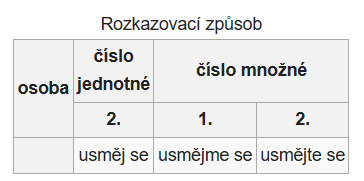

You can just google "[czech-word] Wiktionary" and something will come up (tho you might need to automatically translate it like I did in the screenshots above). Or you can use any of the dictionaries that I'll be mentioning in the next part.
2. Misplaced politeness
Czech singular uses something called "tykání" and "vykání" in second-person verbs to indicate politeness. Tykání could be the equivalent of using thou/thee in older forms of English or being on a first-name basis with the one you're talking to. Vykání is reserved for interactions with people you don't know (usually not online though) or people of a higher status than you.
Arcane example:
Viktor would use tykání when talking to: friends, students (while also being a student), family, children
And he would use vykání when talking to: Heimerdinger and other professors, students (while being a lecturer or a TA), strangers, colleagues (that he's not friends with), anyone he calls Mr./Ms./Mrs./Mx.
But why am I talking about all this:
Google Translator uses tykání and vykání as it pleases. So if you want to translate a sentence using the second person, you need to pay attention. Because I can't show you a good example using Google as its translations aren't really consistent, I'll be using Deepl in the examples. But first:
What tykání and vykání look like in Czech?
There's one more thing you need to know about tykání and vykání. While both refer to a singular individual, vykání (the polite one) looks almost exactly like the second person plural.
So finally here's the difference:
You are Jayce.
– Ty jsi Jayce. = tykání, singular
– Vy jste Jayce. = vykání, singular
You (y'all) are Jayces.
– Vy jste Jaycové. = plural
As you can see, both plural and vykání end with -te. That's the biggest clue for you.
I'll give you one more example, this one should sum up what I've told you so far:

When Viktor says this sentence, he's talking to a student he's just met so he would probably use vykání when talking to him. Deepl gave us 4 options, so which one can we choose?
"Trochu egoistické, nemyslíte?" This one can be both vykání and plural.
"Trochu egoistické, nemyslíš?“ This one is tykání. Viktor would say that to a friend or a family member but not a person he's just met.
"Není to trochu egoistické?" The literal translation of this one is "Isn't it a bit egotistical?" so we're avoiding the second person entirely. He could say this to anyone.
"Trochu sobecké, nemyslíte?" Same as no. 1.
Now a nerdy addition for the bravest of you:
I said vykání and second person plural are ALMOST the same. The difference is for example in the past tense indicative that uses an L-participle – nemysleL(i) – and an auxiliary verb "to be / být" in the present tense.
Did you stabilize it?
– Stabilizoval jsi to? = tykání, singular
– Stabilizoval jste to? = vykání, singular
– Stabilizovali jste to? = plural
Also as some of you may know, most participles are gendered. The examples I gave you are masculine, the feminine participles would be stabilizovala/stabilizovaly and the neuter ones would be stabilizovalo/stabilizovala. The rest is the same.
If you want to make sure you're using the correct second person, you can translate your sentence using Deepl and choose the option that uses / doesnt use the -te suffix. That applies for all the moods and tenses that recognise the 2nd person. If you want to make sure your vykání in past tense isn't accidentally in plural, you can add a name at the end/beginning of the sentence and then copy it without the name. For the opposite effect you can add for example a plural demonym (Did you stabilize it, Czechs?) or just use "y'all" instead of "you".
3. Gender in the adjectival predicate
Czech adjectives are gendered (as well as all nouns). Masculine adjectives (in nominative singular) usually have the final suffix -ý, feminine -á and neutral -é:

They can also end with í, that means it can be any of those three grammatical genders:

Plus some foreign adjectives aren't any of those:

But there's one sentence that could give you trouble. It was the first sentence I thought of when I was trying to find examples for this post:

As you can see, Deepl doesn't accept mpreg as it uses only the -á suffix for the adjective "pregnant". Don't get confused, you can just slap -ý on it (Jsem těhotný...) and you'll be fine!
That's all I have for you rn. If you need help, just send an Ask or DM me, I can answer any Czech and Czechia related questions or beta read your fic. If you know anyone that could benefit from this, send them my profile or smth, idk.
It'll take a while for me to make the third part of this, posts like these take a longer time than I thought lol
8 notes
·
View notes